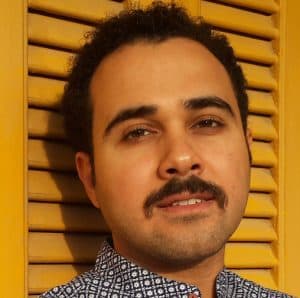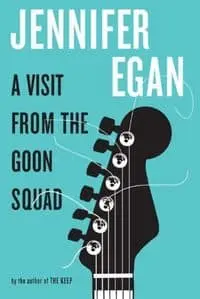The PEN Ten Interview: Ahmed Naji on Language, Identity, and Writing in Exile

The PEN Ten is PEN America’s weekly interview series. This week Lily Philpott, Public Programs Manager at PEN America, speaks with Ahmed Naji, 2016 PEN/Barbey Freedom to Write Award recipient and the author of three books: Rogers (2007), Seven Lessons Learned from Ahmed Makky (2009), and The Use of Life (2014). Ahmed will join us for this year’s World Voices Festival at Cry, the Beloved Country on May 9. You can purchase tickets for the event here »
1. What was the first book or piece of writing that had a profound impact on you?
One Thousand and One Nights. I read it for the first time when I was young. I was amazed by the endless stories, the magical sex, and the mysterious worlds. And above all, the idea that no one knows who the writer is. I still read it from time to time and collect different copies of it.
2. How does your writing navigate truth? How do you work across genres to navigate the relationship between truth and fiction?
I believe it’s a writer’s job to create the truth. In fiction, readers know it’s lies, but they think it is (if the writing is good) more accurate than what they read in newspapers.
I always keep a notebook beside my bed, where I write real dreams when I wake up. After a couple of days, I go back and read what I wrote, and sometimes I feel puzzled: “Did I have this dream? Did I see this person really in my dream?” But my dream journal will establish the truth; it’s here to tell me what I forget, what I dreamed of . . . to say to me the truth about the fiction of dreams.
We forget many details of our dreams, sometimes we forget our dreams totally. My ambition is that my writing will have the same impact as that “dream journal” has on me, to establish the truth, and to encourage the readers to doubt what been told as truth.
“I believe it’s a writer’s job to create the truth.”
3. What does your creative process look like? How do you maintain momentum and remain inspired?
The key, in my opinion, is to deal with writing as a way of living your life: It’s not a job or a mission to achieve something. If you dealt with it as a job, you will always look for reward or sometimes will be puzzled about the purpose of what you are doing.
I enjoy writing and reading, and I see it as a way of enjoying life, and through this joy, you will always find inspiration. I hear a lot about the writer’s block, but I never experienced it. My problem is that I have a lot of things in my mind and my notebook, but I can’t find the time to write them down.
Don’t wait for the great ideas, but keep writing and reading and it will come. You could write for 10 days a dull draft piece about the sea, but I am sure in the 11th day you will write the beautiful essay, and if not, write again in the 12th day.
4. What is one book or piece of writing by an Egyptian author you love that readers might not know about?
In poetry, I will suggest Iman Mersal.
In nonfiction: Haytham El-Wardany.
In fiction and novels: Nael Eltoukhy and Mohammed Rabie.
For all of them, most of their works have been translated into English.
5. Whose words do you turn to for inspiration?
Two poets: Georges Henein and Joyce Mansour
6. What is the last book you read? What are you reading next?
A Visit from the Goon Squad by Jennifer Egan, and on my list two other books to choose between: The Prisoner of Heaven by Carlos Ruiz Zafón or Philosophy for Militants by Alain Badiou.

7. What does it mean to you to be, temporarily at least, a writer in exile? Do you find that you are thinking and writing about Egypt in different ways?
The real dilemma is not how to write about Egypt, but it’s about the language. I look around myself here in America, and I see many writers from Egypt or other countries living in exile. I notice two tracks available for an exiled writer here:
1—To continue doing what you used to do. Living in Las Vegas but writing about Egypt in Arabic. Following what is happening in your old country but know nothing about your neighborhood. In the end, after a couple of years, you end up having no connection with where you are living or the country you came from. Because of time passing, you end up writing about a country that you used to know, a country that doesn’t exist anymore
2—Another track is to take off your clothes, your old identity. To leave your language and adopt a new language and a new identity. The trick is that America and American culture is built on identity. I notice writers who come here and give the American public and culture institutes what they want to hear.
I didn’t make it a year here, and some people will approach me as “a Muslim writer” or “Borwen writer,” and I don’t even understand what that means.
Anyway, for now at least, I am not sure where I am heading, but I am confident about the following:
A—I don’t want to be sad, or a prisoner of my own nostalgia. It’s an excellent opportunity to be here, and I am thirsty. I want to learn everything, and to rethink everything I used to believe in.
B—I wish to be part of the community that I am living in and to be able to give back.
C—It’s all connected darling, what happens here effects on what is going there. If Trump becomes a president for another four years, that means Sisi in Egypt will be president for another ten years, which mean NO Egypt for me for another ten years. So all battles are connected, and the show goes on.
“I want to learn everything, and to rethink everything I used to believe in.”
8. You’ve spoken about being under strict surveillance in Cairo after being released from prison. Do you think living under this daily surveillance will have a lasting effect on your writing?
Being out of Egypt doesn’t mean I am totally free. I still have family there. Also, the surveillance continues even if you left the country. Lately, the current Egyptian government is following the political opponents who are living abroad, and even writers. Alaa Al-Aswiny, the well-known Egyptian writer, has been sued by military prosecutors because of his last novel. Sometimes the embassies refuse to renew the dissident’s passports.
I believe censorship and surveillance are part of modern life, and part of the writer’s job is to deal with it sometimes by fighting, sometimes by coaxing. It’s not only about political issues, but social values are playing an important role, and fighting against it is harder than fighting against authoritarian authorities.
9. What advice do you have for young writers?
I don’t have anything to say for young writers. The opposite: I would like a bit of advice from them. My advice is for the old writers: Don’t get comfortable with what are you doing just because everyone around you is clapping for whatever you say. Don’t give your readers (or worse, your editor) what they are expecting; it’s refreshing to lose some readers from time to time.
10. Which writer, living or dead, would you most like to meet? What would you like to discuss?
Lately, I have been thinking about Salman Rushdie. If we once met and had the time, I would like to know how he did it and escaped from the battle that they tried to drag him into, and was able to re-shape and reform his identity and his writing style, and how he was able to escape from the frames that constricted him.
11. In an interview with Electric Literature, you said: “Leaving Egypt now allows me to finally breathe and think freely, to test out my ideas, and reexamine everything that’s happened.” How do you anticipate your work will change while you are living in America?
Writing is a way of understanding yourself, and also following your environment. I am open to everything, and I am sure that living in America will have an impact on my writing. Until now I only wrote a short text about my experience as a father in America after we got our baby.
Now we are in Las Vegas, a crazy city full of stories and inspiration. I am sure to be able to understand all of this, I have to write about it.
Another thing is the audience and the language. Before coming here when I was writing, I used to imagine my readers to be Egyptian or Arab. Arabic also was the language that I used. But since we arrived here, I started to think differently, and even sometimes, like answering your questions, I use English.






